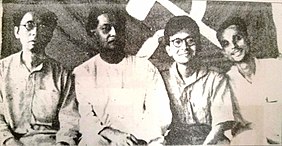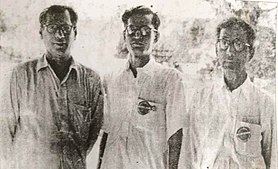Muzaffar Ahmad
Muzaffar Ahmad | |
|---|---|
Calcutta, West Bengal, India | |
| Nationality | Indian |
| Other names | Kakababu |
| Political party | Communist Party of India (Marxist) |
Muzaffar Ahmad (known as Kakababu; 5 August 1889 – 18 December 1973) was an Indian-Bengali politician, journalist and a co-founder of the Communist Party of India.
Background
Ahmed was born on 5 August 1889 at Musapur village on
Career
He participated in political meetings and demonstrations starting in 1916. In 1918, he was appointed assistant secretary of the literary society
Ahmed was one of the founders of the


On 20 March 1929, the
After the partition of India in 1947, Ahmed moved to Kolkata rather than staying in East Pakistan (now Bangladesh). On 25 March 1948, the Communist Party of India was banned by the government of India and Ahmed was imprisoned. He was released from prison in 1951. He was again arrested and incarcerated for two years in 1962, and another time for two years in 1965. He was imprisoned several times in post-Independence India by the Congress government.
Personal life
Ahmed had a daughter, Nargis.[8] She was married to the poet Abdul Quadir.[8]
Legacy
- Co-founder of Communist Party of India, 26 December 1925.
- Founder of National Book Agency, 26 June 1939.[9]
- The headquarters of the Communist Party of India (Marxist) in West Bengal is named after him.
- Ripon Street, a thoroughfare in Kolkata, was renamed "Muzaffar Ahmad Street".
Selected works
- Qazi Nazrul Islam: Smritikatha (in Bengali).[10]
- Amar Jiban O Bharater Communist Party (in Bengali).[11]
- Krishak Samasya (in Bengali)[12][13]
- Prabase Bharater Communist Party Gathan (in Bengali) [14]
- Bharater Communist Party Gorar Pratham Jug (in Bengali) [15]
- Nirbachita Prabandha (in Bengali) [16]
References
- ^ OL 30677644M. Retrieved 24 April 2024.
- ^ Muzaffar Ahmad (in Bengali). Kolkata: National Book Agency. 1963. p. 2.
- ^ ISBN 81-7648-231-5.
- ^ Chattopadhyay, Suchetana (2011). An Early Communist: Muzaffar Ahmad in Calcutta. Tulika Books, Delhi. p. 86.
- ^ Chattopadhyay, Suchetana (2011). An Early Communist: Muzaffar Ahmad in Calcutta. New Delhi: Tulika Books.
- ^ Mortuza Khaled, A Study in Leadership: Muzaffar Ahmad and the Communist Movement in Bengal, Progressive Publishers, Kolkata 2001
- ISBN 978-81-7955-135-6.
- ^ a b "Remembering Abdul Quadir: Life and Anecdotes". The Daily Star. 1 June 2019. Retrieved 1 June 2019.
- ^ "National Book Agency".
- ^ Ahmad, Muzaffar (1967). Qazi Nazrul Islam - Smritikatha (2 ed.). Kolkata: National Book Agency.
- ^ Ahmad, Muzaffar. "Amar Jiban O Bharater Communist Party". National Book Agency.
- ^ Ahmad, Muzaffar (1954). Krishak Samasya. Kolkata: National Book Agency.
- ISBN 9780429275937.
- ^ Ahmad, Muzaffar (1961). Prabase Bharater Communist Party Gathan. Kolkata: National Book Agency.
- ISBN 9789849616047.
- ^ Ahmad, Muzaffar (2011). Nirbachita Prabandha. Kolkata: National Book Agency.
